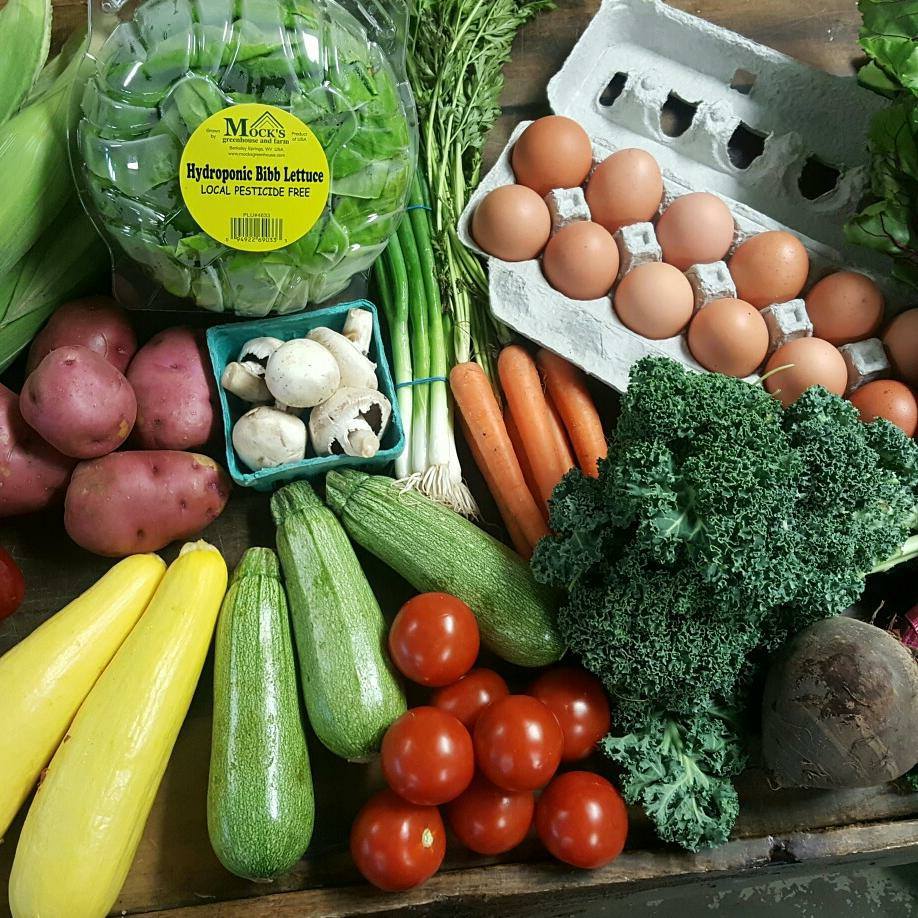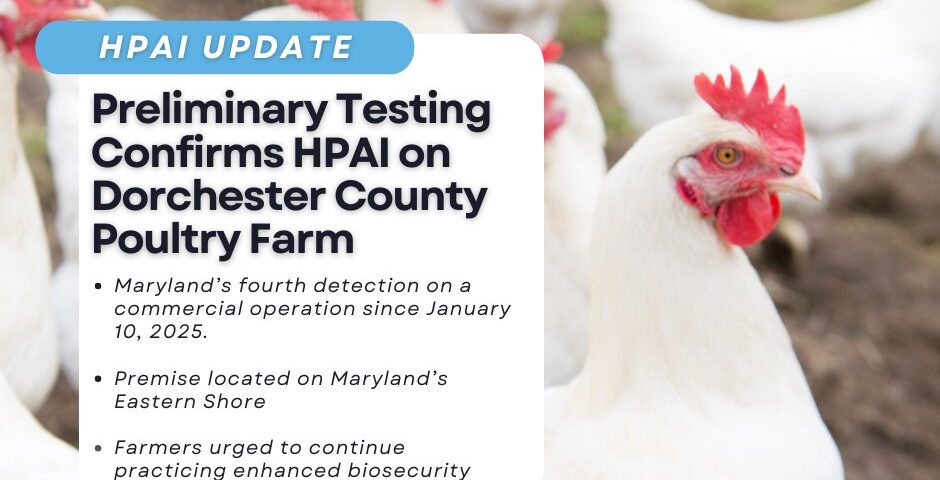
USDA Grants available for Expanded Market Opportunities for Value-Added Ag
January 21, 2025
Maryland Farm Bureau Scholarships Open
January 21, 2025Highly Pathogenic Avian Influenza Detected in Maryland

ANNAPOLIS, MD (January 20, 2025)— The Maryland Department of Agriculture announced the first presumptive positive case of H5 avian influenza in a commercial broiler farm in Dorchester County. This is the fourth case of highly pathogenic H5 avian influenza (HPAI) on a commercial poultry farm on Maryland’s Eastern Shore. Confirmation by the U.S. Department of Agriculture’s National Veterinary Services Laboratory (NVSL) is pending with final results anticipated in the coming days.
This new case arises just six days after a presumptive positive result was identified at a commercial poultry farm in Caroline County. In total, there are now seven commercial operations in the Delmarva region confirmed to have HPAI, including two premises in Kent County, Delaware, and one premises in Accomack County, Virginia.
State officials have quarantined all affected premises, and birds on the properties are being or have been depopulated to prevent the spread of the disease. Birds from affected flocks will not enter the food system.
Confirmation by the U.S. Department of Agriculture’s (USDA) National Veterinary Services Laboratory is pending with final results anticipated in the coming days.
Avian influenza is a highly contagious airborne respiratory virus that spreads easily among birds through nasal and eye secretions, as well as manure. The virus can be spread in various ways from flock to flock, including by wild birds, through contact with infected poultry, by equipment, and on the clothing and shoes of caretakers. This virus affects poultry, like chickens, ducks, and turkeys, along with some wild bird species such as ducks, geese, shorebirds, and raptors.
According to the Maryland Department of Health, the risk of transmission between birds and the general public is low. Those who work directly with poultry or dairy farms may be more at risk and should follow key biosecurity practices.
The Maryland Department of Agriculture continues to urge growers and backyard flock owners to enhance biosecurity practices and become familiar with what to do if HPAI is suspected in a flock. The U.S. Centers for Disease Control and Prevention share more guidance here.
- Look for signs of illness. Know the warning signs of infectious bird diseases.
- Report suspected sick birds:
- To report a possible case of HPAI in a commercial or backyard flock, call the Maryland Department of Agriculture at 410-841-5810.
- Commercial chicken growers and backyard flock owners can email questions about the outbreak to MD.Birdflu@maryland.gov.
- To report a sick wild bird in Maryland, call the Maryland Department of Natural Resources (DNR) Wildlife Services hotline at (877) 463-6497 between 8 a.m. and 4:30 p.m. Monday through Friday.
Key biosecurity practices:
- Clean and disinfect transportation. Don’t walk through or drive trucks, tractors, or equipment in areas where waterfowl or other wildlife feces may be. If you can’t avoid this, clean your shoes, vehicle, and equipment thoroughly to prevent bringing disease agents back to your flock. This is especially important when visiting with farmers or those who hunt wildfowl such as when gathering at a local coffee shop, restaurant, or gas station.
- Remove loose feed. Don’t give wild birds, rodents, and insects a free lunch. Remove spilled or uneaten feed right away, and make sure feed storage units are secure and free of holes. Wild birds can carry HPAI.
- Keep visitors to a minimum. Only allow those people who take care of your poultry to come in contact with your birds, including family and friends. Make sure everyone who has contact with your flock follows biosecurity principles.
- Wash your hands before and after coming in contact with live poultry. Wash with soap and water. If using a hand sanitizer, first remove manure, feathers, and other materials from your hands because disinfectants will not penetrate organic matter or caked-on dirt.
- Provide disposable boot covers (preferred) and/or disinfectant footbaths for anyone having contact with your flock. If using a footbath, be sure to remove all droppings, mud, or debris from boots and shoes using a long-handled scrub brush BEFORE stepping into the disinfectant footbath, and always keep it clean.
- Change clothes before entering poultry areas and before exiting the property.
Visitors should wear protective outer garments or disposable coveralls, boots, and headgear when handling birds, and shower and/or change clothes when leaving the facility. - Clean and disinfect tools or equipment before moving them to a new poultry facility. Before allowing vehicles, trucks, tractors, or tools and equipment—including egg flats and cases that have come in contact with birds or their droppings—to exit the property, make sure they are cleaned and disinfected to prevent contaminated equipment from transporting disease. Do not move or reuse items that cannot be cleaned and disinfected—such as cardboard egg flats.
For more information on avian influenza, visit: https://mda.maryland.gov/Pages/AvianFlu.aspx.
Note to media: Due to biosecurity concerns, no on-site interviews, photos, or videos are allowed. For all media requests, email: lauren.moses1@maryland.gov.


